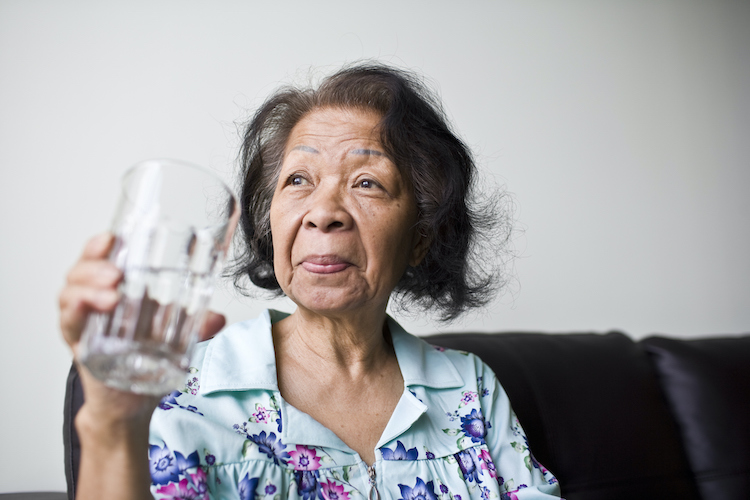
Take the time to familiarize yourself with the signs of dehydration in seniors.
During the hottest time of year, maintaining proper hydration is necessary, especially for aging parents. As a matter of fact, approximately half of all seniors are chronically under-hydrated, as reported by a recent UCLA study, which can lead to an assortment of health problems, including kidney stones, urinary tract infection, and also an increased risk for falls.
The prevalence of dehydration in seniors is attributed to a variety of factors, including:
- A diminished level of water naturally occurring in aging bodies
- Medication side effects
- Less sensitivity to the sensation of thirst
- A decreasing ability to maintain an ideal fluid level balance in the body
- Diminished efficiency of the kidneys
- And more
There’s a simple calculation to find out how much water a senior should drink each day. Take the individual’s body weight in pounds, and drink 1/3 that many ounces of water each day. Somebody who weighs 120 pounds, for instance, should drink at the least 40 ounces of water – about five 8-ounce glasses.
Time is critical in ensuring hydration in senior loved ones, as it is much simpler to correct mild dehydration before it gets to be more serious. Signs of dehydration in seniors include:
Mild Dehydration:
- Decreased, darker-colored urine
- Dry mouth
- Dizziness and fatigue
- Muscle cramping
- Irritability
- Headaches
Severe Dehydration:
- Disorientation and confusion
- Difficulty with walking
- Weak, fast pulse
- Low blood pressure levels
- Worsening of muscle cramps
- Sunken, dry eyes
- Skin that is wrinkled and has lost elasticity
- Bloating
- Quickened breathing
- Convulsions
Find medical help promptly should you suspect dehydration in a senior loved one, to avoid significant health complications that might develop rapidly.
If a senior loved one resists drinking enough water, try flavoring the water or offering juice, if it’s a suitable part of the older adult’s dietary plan. For those with conditions such as diabetes or obesity, the sugar content in juice can be dangerous. In some cases, adjusting the temperature of the beverage makes it more appealing as well; for example, warming up a cup of water with some lemon to sip on each morning, and then furnishing chilled water over crushed ice during the afternoon.
One of the keys is to have fluids available throughout the day. Geriatric nurse Anne Vanderbilt, CNS, explains, “What I often see in our advanced older adults – people in their 80s and 90s – is that they can’t sit down and drink a full 8-ounce glass of water. It fills them up, causes bloating and then makes them have to run to the bathroom. So little sips throughout the day are better.”
In order to help ensure the seniors you love are remaining hydrated and healthy, partner with Grace Home Care for knowledgeable caregivers in Topeka and the surrounding areas. We can help monitor fluid intake, prepare nutritious meals, motivate older adults to stay physically active, and much more to ensure optimal wellbeing. Reach out to us at 785-286-2273 for a complimentary in-home evaluation and for more information about our home care services in Topeka and the surrounding communities.
